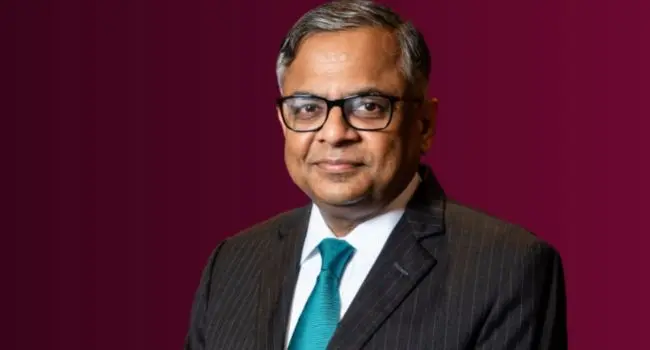N Chandrasekaran Ranks Among Highest-Paid CEOs with Rs 156 Crore Compensation in FY25

N Chandrasekaran, the executive chairman of Tata Sons, has seen a substantial increase in his compensation, reaching Rs 156 crore for the fiscal year 2025. This marks a 15% rise from the previous year, solidifying his position as one of the highest-paid executives in India. Since assuming leadership in February 2017, Chandrasekaran’s earnings have grown significantly, reflecting the robust performance of the Tata Group, which is valued at $180 billion.
Chandrasekaran’s Rising Earnings
N Chandrasekaran’s compensation has seen remarkable growth since he became the chairman of Tata Sons. In FY25, his earnings rose to Rs 156 crore, up from Rs 135 crore in FY24. This increase of 15% highlights his successful leadership within the Tata Group. When he first took on the role in FY18, his remuneration was Rs 55 crore, showcasing a substantial upward trajectory over the years. Chandrasekaran now joins the ranks of a select group of Indian executives earning over Rs 150 crore annually. Other notable figures in this high-earning category include Rajiv Kaul, vice-chairman of CMS Info Systems, who earned Rs 181 crore in FY24, and Sandeep Kalra, CEO of Persistent Systems, with Rs 148 crore in FY25.
Tata Group’s Semiconductor and Aviation Ventures
The Tata Group’s semiconductor manufacturing arm has emerged as a key revenue contributor, ranking as the sixth-largest within the conglomerate just five years after its establishment. Tata Electronics, which began operations in 2020, reported revenues of Rs 66,601 crore in FY25, despite a modest loss of Rs 70 crore. This indicates a potential for profitability in the near future. The company has made strategic acquisitions, including the Rs 1,078 crore purchase of Wistron India in 2024 and a Rs 1,650 crore investment for a 60% stake in Pegatron India. Tata Sons also invested Rs 3,000 crore in Tata Electronics in FY25, reflecting confidence in the growth of this capital-intensive sector.
In addition to its semiconductor business, the Tata Group’s aviation sector has generated significant revenue, amounting to Rs 78,636 crore, making it the fourth-largest contributor to the group’s overall earnings. However, Air India, which was acquired by Tata Sons in 2022, has emerged as the largest loss-making entity within the conglomerate, requiring an investment of Rs 3,225 crore in FY25.
Financial Performance of Tata Digital and TCS
Tata Digital, which operates the Tata Neu super app, reported a substantial loss of Rs 4,610 crore in FY25. In response, Tata Sons infused Rs 3,960 crore into the digital venture to support its growth. Despite these challenges, Tata Group’s flagship company, Tata Consultancy Services (TCS), remains a strong performer, contributing Rs 48,797 crore in profits. This highlights the diverse financial landscape within the Tata Group, where some sectors thrive while others face difficulties.
Overall, the Tata Group’s financial performance in FY25 reflects both the challenges and opportunities present in various sectors. As the conglomerate continues to navigate these dynamics, the leadership of N Chandrasekaran will be crucial in steering the organization toward sustained growth and profitability.
Observer Voice is the one stop site for National, International news, Sports, Editor’s Choice, Art/culture contents, Quotes and much more. We also cover historical contents. Historical contents includes World History, Indian History, and what happened today. The website also covers Entertainment across the India and World.

